-
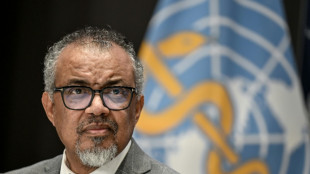 WHO chief says turmoil creates chance for reset
WHO chief says turmoil creates chance for reset
-
European stocks rise as gold, oil prices tumble

-
 Rink issues resolved, NHL stars chase Olympic gold at Milan
Rink issues resolved, NHL stars chase Olympic gold at Milan
-
Rodri rages that officials 'don't want' Man City to win

-
 Gaza's Rafah crossing makes limited reopening after two-year war
Gaza's Rafah crossing makes limited reopening after two-year war
-
African players in Europe: Ouattara dents Villa title hopes

-
 Liverpool beat Chelsea to Rennes defender Jacquet - reports
Liverpool beat Chelsea to Rennes defender Jacquet - reports
-
S. Korea celebrates breakthrough Grammy win for K-pop's 'Golden'

-
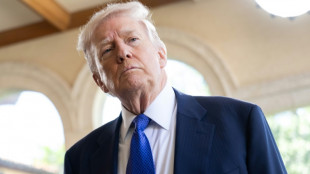 Trump says US talking deal with 'highest people' in Cuba
Trump says US talking deal with 'highest people' in Cuba
-
Trump threatens legal action against Grammy host over Epstein comment
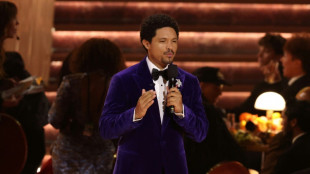
-
 Olympic Games in northern Italy have German twist
Olympic Games in northern Italy have German twist
-
Bad Bunny: the Puerto Rican phenom on top of the music world
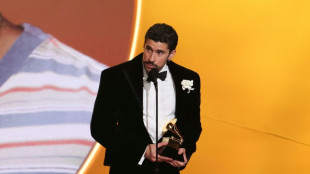
-
 Snapchat blocks 415,000 underage accounts in Australia
Snapchat blocks 415,000 underage accounts in Australia
-
At Grammys, 'ICE out' message loud and clear

-
 Dalai Lama's 'gratitude' at first Grammy win
Dalai Lama's 'gratitude' at first Grammy win
-
Bad Bunny makes Grammys history with Album of the Year win

-
 Steven Spielberg earns coveted EGOT status with Grammy win
Steven Spielberg earns coveted EGOT status with Grammy win
-
Knicks boost win streak to six by beating LeBron's Lakers

-
 Kendrick Lamar, Bad Bunny, Lady Gaga triumph at Grammys
Kendrick Lamar, Bad Bunny, Lady Gaga triumph at Grammys
-
Japan says rare earth found in sediment retrieved on deep-sea mission
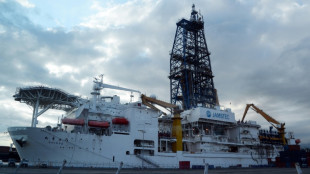
-
 San Siro prepares for last dance with Winter Olympics' opening ceremony
San Siro prepares for last dance with Winter Olympics' opening ceremony
-
France great Benazzi relishing 'genius' Dupont's Six Nations return

-
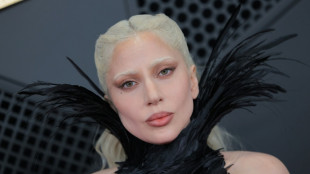 Grammy red carpet: black and white, barely there and no ICE
Grammy red carpet: black and white, barely there and no ICE
-
Oil tumbles on Iran hopes, precious metals hit by stronger dollar

-
 South Korea football bosses in talks to avert Women's Asian Cup boycott
South Korea football bosses in talks to avert Women's Asian Cup boycott
-
Level playing field? Tech at forefront of US immigration fight

-
 British singer Olivia Dean wins Best New Artist Grammy
British singer Olivia Dean wins Best New Artist Grammy
-
Hatred of losing drives relentless Alcaraz to tennis history
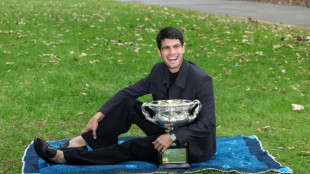
-
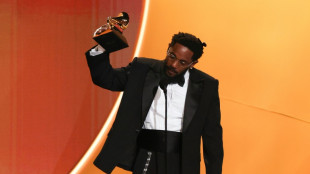 Kendrick Lamar, Bad Bunny, Lady Gaga win early at Grammys
Kendrick Lamar, Bad Bunny, Lady Gaga win early at Grammys
-
Surging euro presents new headache for ECB
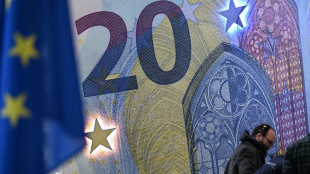
-
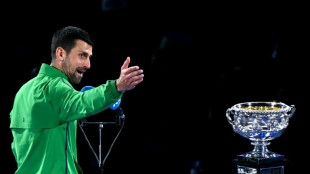 Djokovic hints at retirement as time seeps away on history bid
Djokovic hints at retirement as time seeps away on history bid
-
US talking deal with 'highest people' in Cuba: Trump

-
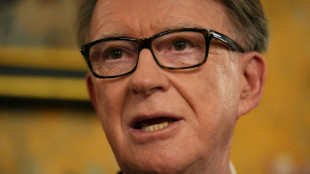 UK ex-ambassador quits Labour over new reports of Epstein links
UK ex-ambassador quits Labour over new reports of Epstein links
-
Trump says closing Kennedy Center arts complex for two years
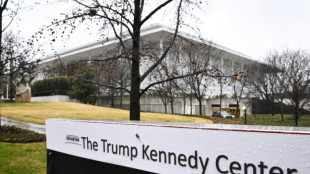
-
 Phoenix Motor's EdisonFuture Subsidiary Expands into Advanced Robotics with U.S. - Manufactured Robotic Dog Platform and RFaaS Business Model
Phoenix Motor's EdisonFuture Subsidiary Expands into Advanced Robotics with U.S. - Manufactured Robotic Dog Platform and RFaaS Business Model
-
Iron Dome Acquisition I Corp. Files Registration Statement for a $200 Million Proposed Initial Public Offering

-
 NHI Announces $105.5 Million SHOP Investment
NHI Announces $105.5 Million SHOP Investment
-
Kiwi Ears Cadenza II Debuts with Upgraded KARS 2.0 and New Dynamic Driver

-
 IRS Filing Deadline Is Today: Businesses Must File 2025 Information Returns by February 2
IRS Filing Deadline Is Today: Businesses Must File 2025 Information Returns by February 2
-
ABB Introduces Automation Extended:Eenabling Industrial Innovation with Continuity

-
 Reigning world champs Tinch, Hocker among Millrose winners
Reigning world champs Tinch, Hocker among Millrose winners
-
Venezuelan activist ends '1,675 days' of suffering in prison

-
 Real Madrid scrape win over Rayo, Athletic claim derby draw
Real Madrid scrape win over Rayo, Athletic claim derby draw
-
PSG beat Strasbourg after Hakimi red to retake top spot in Ligue 1

-
 NFL Cardinals hire Rams' assistant LaFleur as head coach
NFL Cardinals hire Rams' assistant LaFleur as head coach
-
Arsenal scoop $2m prize for winning FIFA Women's Champions Cup

-
 Atletico agree deal to sign Lookman from Atalanta
Atletico agree deal to sign Lookman from Atalanta
-
Real Madrid's Bellingham set for month out with hamstring injury

-
 Man City won't surrender in title race: Guardiola
Man City won't surrender in title race: Guardiola
-
Korda captures weather-shortened LPGA season opener

EU: How do we deal with Donald Trump?
The prospect of Donald Trump returning to the Oval Office as the 47th President of the United States presents the European Union (EU) with a complex array of challenges and considerations. A renewed Trump presidency could significantly alter the transatlantic relationship, impacting economic ties and security cooperation. It is imperative for the EU to proactively assess its strategies to navigate this potential shift in U.S. foreign policy.
Recalibrating Diplomatic Engagement
Under President Trump's previous tenure, the transatlantic alliance experienced strains over issues such as trade tariffs, NATO funding, and differing approaches to global agreements like the Paris Climate Accord and the Iran Nuclear Deal. The EU should prepare for a diplomatic landscape where unilateral U.S. decisions might resurface. Strengthening intra-EU cohesion and presenting a unified front in negotiations could enhance the bloc's ability to manage disagreements effectively.
Economic Implications and Trade Policies
A Trump administration may revisit protectionist trade policies, potentially reinstating tariffs on European goods. The EU should consider:
- Diversifying Trade Partnerships: Reducing reliance on the U.S. market by expanding trade agreements with other global partners could mitigate economic risks.
- Enhancing Internal Markets: Strengthening the Single Market can bolster the EU's economic resilience against external shocks.
- Negotiating Trade Terms: Proactive engagement with U.S. counterparts to find mutually beneficial trade arrangements may prevent escalations.
Security and Defense Considerations
Trump's previous criticisms of NATO and demands for increased defense spending from European allies could resurface. The EU might need to:
- Boost Defense Capabilities: Investing in European defense initiatives can reduce dependency on U.S. military support.
- Promote Strategic Autonomy: Developing independent security strategies allows the EU to respond to global threats more effectively.
- Maintain Open Channels: Continuous dialogue with U.S. defense officials is crucial to preserve cooperation on shared security interests.
Climate Change and Environmental Policies
Given Trump's past withdrawal from the Paris Climate Accord, environmental collaboration may face challenges. The EU should:
- Lead Global Efforts: Continue to champion climate initiatives on the international stage, encouraging other nations to commit to environmental goals.
- Engage in Dialogue: Seek common ground with the U.S. on specific environmental issues where cooperation is possible.
Addressing Global Governance and Multilateralism
A shift towards unilateralism in U.S. foreign policy could undermine multilateral institutions. The EU can:
- Support International Organizations: Reinforce commitment to the United Nations, World Trade Organization, and other bodies to uphold global governance structures.
- Forge Alliances: Collaborate with like-minded countries to promote a rules-based international order.
Mitigating Risks of Geopolitical Tensions
Potential policy divergences on relations with countries like China, Russia, and Iran require careful navigation. The EU should:
- Develop Cohesive Foreign Policies: Align member states on key foreign policy positions to present a united stance.
- Engage in Strategic Dialogue: Maintain open communications with the U.S. to manage disagreements and prevent escalations.
Conclusion
A potential second Trump presidency necessitates that the European Union reassesses its approach to transatlantic relations. By prioritizing unity, enhancing strategic autonomy, and engaging in proactive diplomacy, the EU can mitigate potential economic and security risks. Preparing for various scenarios ensures that the EU remains resilient and capable of upholding its interests on the global stage.

EU DECODED: Deforestation law’s trade-offs

Underwater Wi-Fi: European startups woo investors

Cultural year 2024: between Qatar and Morocco

Planning a wellness break? Poland!

Studio Kremlin: creative co-working in Paris

Culture: Serbia’s architectural marvels

EU Residence permits: Record level to third nationals

Trump announces Homan as new 'border czar'

Watch Live: Trump or Harris? America votes!

Georgia: Ruling party celebrates election victory

Asylum seekers: Return centres – a Solution?



